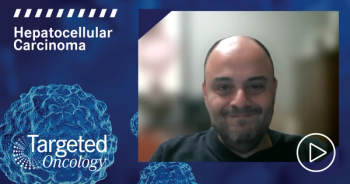
Treatment Response and Side Effects with Regorafenib
Anthony El-Khoueiry, MD:Given the fact that regorafenib is a new tool that we have for usage in second-line treatment of hepatocellular carcinoma, post-sorafenib progression, my advice would be to monitor patients carefullyespecially during the first 4 to 6 weeks. As we know, the rate of adverse events seems to be highest in the first 4 to 6 weeks with these targeted therapies, whether it’s sorafenib or regorafenib. I do believe that it would be reasonable to start at the full dose and do careful monitoring and aggressive patient education in regards the potential adverse events. I believe that the monitoring should focus on symptoms related to fatigue, anorexia, diarrhea, and hypophosphatemia. And liver function should be monitored, but there were no major flags with the usage of regorafenib.
As far as monitoring response, the objective response rate tends to be relatively low with these targeted therapies, around 6% to 7%. But doing imaging studies at regular intervals of around 6 to 8 weeks would be certainly reasonable in order to discontinue therapy upon reprogression, in order not to expose the patient to unnecessary toxicity.
There’s also a question as to whether or not the tolerability of regorafenib in HCC is similar to the tolerability of regorafenib in colorectal cancer. This is difficult to answer because we would need to be doing cross-trial comparisons in different patient populations. But, nonetheless, there are some differences that are noteworthy. The patients with colorectal cancers tend to have prior therapy with multiple lines of cytotoxic chemotherapy. So, they have a different prior therapy course and they tend to be more heavily pretreated, and potentially have a poorer performance status by the time they use regorafenib.
Without getting into the details of the adverse event comparisons, the RESORCE trial seems to indicate that patients with HCC tend to tolerate regorafenib relatively well, including not having a compromise of their liver function; reasonable rates of grade 3 and grade 4 adverse events, such as fatigue and diarrhea; and no unique adverse events that were not seen in other patient populations using regorafenib.
Transcript edited for clarity.
February 2014
- A 63-year old male with HBV
- ECOG=0
- Child-Pugh A; platelet count 230,000 cells/mcL
- Bilirubin 1.0 mg/dL; Albumin 3.5 g/dL
- CT scan revealed liver lesions, 1 is 2-cm; 1 is 5-cm both in the right lobe
- No extrahepatic disease
- Biopsy confirmed HCC diagnosis
- AFP=5400 IU/ml
- Tumors were resected with RO margin
August 2016
- Imaging showed recurrence in the liver, metastatic disease in the lungs
- Therapy was initiated with sorafenib 400 mg BID
- Therapy was well-tolerated
April 2017
- Radiographic progression with multiple lung metastases
- ECOG=0
- Therapy with regorafenib initiated at 160 mg
- Starting dose was well-tolerated, patient experienced some fatigue









































